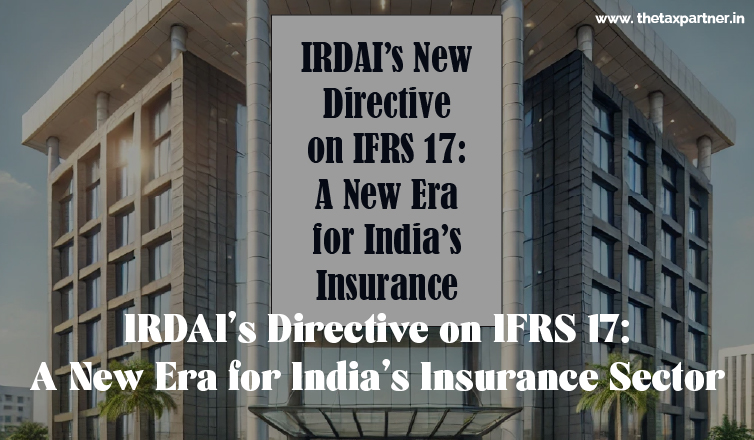Connect with us for all your queries



The Insurance Regulatory and Development Authority of India (IRDAI) has taken a significant step toward modernizing the financial reporting standards in the insurance industry by mandating the implementation of International Financial Reporting Standard (IFRS) 17. The insurance regulator has extended the timeline for this critical transition, setting FY27 as the new deadline for all insurance companies in India to fully implement IFRS 17. This revision grants additional time to both bank-sponsored and non-bank-sponsored insurers to comply with the intricate requirements of the new accounting standard.
Previously, IRDAI had set FY25 as the deadline for this transition. However, the two-year extension reflects the complexities involved in adopting a framework that aligns with global standards, as well as the regulator's commitment to ensuring a smooth and phased implementation process.
IFRS 17 is a global accounting standard issued by the International Accounting Standards Board (IASB) that governs the way insurance contracts are reported in financial statements. It was officially implemented globally on January 1, 2023, and is regarded as one of the most significant changes in the insurance sector’s financial reporting landscape in decades.
The standard provides a framework for the classification and measurement of assets and liabilities, giving consistency to the principles used in reporting insurance contracts. It introduces a uniform approach to accounting for insurance contracts, aimed at improving transparency, enhancing comparability across borders, and allowing for more informed decision-making by investors and other stakeholders.
Under IFRS 17, the measurement of insurance contracts will be more consistent with the underlying economics of the contracts, thus providing a clearer view of an insurer’s financial performance. It will also significantly alter the way insurance companies disclose their financials, making it easier for stakeholders to assess profitability and risk.
As part of its initiative to bring Indian insurers in line with global standards, IRDAI initially set FY25 as the deadline for IFRS 17 implementation. However, based on industry feedback and considering the complexity of the transition, the regulator has extended the deadline to FY27. According to Niraj Shah, Executive Director (ED) and Chief Financial Officer (CFO) of HDFC Life Insurance, the phased implementation plan will involve large listed and unlisted insurers as part of the first wave.
Shah confirmed that the industry has received communication from IRDAI outlining its intention to start the rollout of IFRS 17 by April 2027. He further explained that insurance companies would have around 24 to 30 months to prepare for the transition, ensuring that they have ample time to align their reporting systems with the new standard.
The adoption of IFRS 17 marks a paradigm shift in the way insurance companies present their financials. The new standard requires insurers to calculate the value of their insurance liabilities based on current assumptions, rather than historical data, making it more reflective of the actual risk profile of the insurer. This will result in financial statements that more accurately represent the profitability and financial health of an insurer.
For domestic insurers, the transition to IFRS 17 presents both challenges and opportunities:
IRDAI has adopted a phased approach for the implementation of IFRS 17 to ensure a smooth transition for the industry. This approach reflects the regulator's recognition of the varying levels of preparedness among different players in the sector, particularly between large, listed insurers and smaller, unlisted companies.
Under this phased plan, the larger players in the industry will be required to implement the new standard first, followed by the smaller insurers. This staggered approach is designed to minimize disruption to the sector and to give companies adequate time to address any operational challenges they may face during the transition.
Niraj Shah emphasized that HDFC Life Insurance, along with other major players, is already taking steps to be prepared well ahead of time. However, final implementation guidelines from IRDAI are still awaited, and companies are expected to closely follow the regulator’s directions in the coming months.
To assist insurers in navigating the complexities of IFRS 17, IRDAI has reconstituted an Expert Committee, chaired by its Member (Finance and Investment), to oversee the implementation process. The committee will provide guidance on the technical and operational aspects of the transition and will develop a clear roadmap for the industry, including the phase-wise timelines for compliance.
The committee's work is expected to build upon the foundation laid by the insurance regulator’s earlier initiatives, such as the move towards the Risk-Based Capital (RBC) regime. In December 2023, IRDAI Chairman Debasish Panda highlighted the importance of transitioning to the RBC framework alongside IFRS 17, stating that dedicated mission board teams were working at full throttle to achieve this goal.
The move to RBC, combined with IFRS 17, is expected to modernize the financial and regulatory landscape for insurers, enhancing their resilience in an increasingly competitive global market.
IRDAI’s decision to extend the timeline for IFRS 17 implementation to FY27 reflects the regulator’s commitment to ensuring a smooth transition to the new accounting standard. By adopting a phased approach, IRDAI is allowing insurers ample time to align their operations and financial reporting practices with the new requirements, while also ensuring that the sector remains competitive on a global scale.
For insurers, the adoption of IFRS 17 represents both a challenge and an opportunity. While the transition may require significant changes to their financial reporting systems, the benefits of increased transparency, enhanced comparability, and improved risk management make this a positive step forward for the Indian insurance industry.
With the support of regulatory bodies and the expertise of the reconstituted Expert Committee, Indian insurers are expected to successfully navigate this complex transition and emerge stronger, more transparent, and better aligned with global best practices in the years to come.
Tax Partner is India’s most reliable online business service platform, dedicated to helping you in starting, growing, & flourishing your business with our wide array of expert services at a very affordable cost.